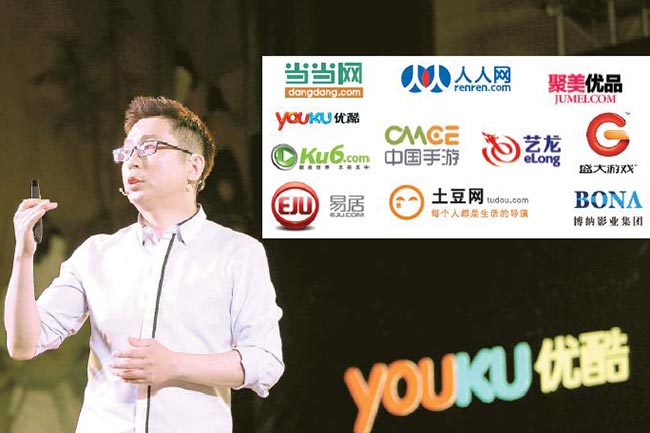Overseas listed tech firms feel home's where future is
 0 Comment(s)
0 Comment(s) Print
Print E-mail China Daily, April 27, 2016
E-mail China Daily, April 27, 2016
|
|
|
Yang Weidong, vice-president of Heyi Group, at a forum in Shanghai. Listed above are some of the firms seeking to delist from the US bourses and list on the A-share market.[Provided to China Daily] |
Many of the Chinese companies that listed overseas, especially in the United States, are pondering delisting and eyeing China's bourses instead.
About 40 overseas-listed Chinese companies said they have initiated moves toward delisting since June 2015, according to data compiled by Tiger Brokers, an app that helps Chinese investors to trade on US bourses.
Not exactly returning prodigals, they feel home's where their future is. One such believer in China's prospects is Victor Koo, chief executive officer of the hitherto New York Stock Exchange-listed Heyi Group, known for its online video site Youku Tudou Inc, dubbed China's YouTube.oe.
Heyi, which listed on the NYSE under the ticker Yoku in December 2010, bought back its shares and went private earlier this month, a process that took six months to complete and entailed $4.5 billion in costs, byway of the buyback offer, excluding incidental costs like the processing fee.
Heyi plans to list in the Chinese mainland by 2019. Koo is confident the delist-and-list exercise would help Heyi evolve into a globe-influencing culture-and-entertainment giant based in China.
Many other CEOs of Koo's ilk are pondering buybacks to follow in Heyi's footsteps.
More than half of the China-bound Chinese companies are internet-related businesses such as Momo Inc, a social networking app, and iDreamSky Technology Ltd, a mobile game developer and publisher.
Until a few years back, market conditions, regulatory stipulations and stringent norms made it difficult for domestic companies to list on the mainland bourses. For example, companies needed to be profitable first before they could apply for an initial public offering.
Also, offshore-registered but Chinese-founded companies such as internet search giant Baidu Inc and the US-listed Chinese e-commerce giant Alibaba Group Holding Ltd, in which overseas variable interest entities or VIEs were substantial shareholders, were not allowed to list on the A-share market.
It was a period when China's internet-related industry was yet to see explosive growth. But it was a boom time for US internet firms. Unlike investors in China, their overseas counterparts understood the value and potential in technology firms.
So, forward-looking but cash-strapped Chinese startups tapped the friendlier US bourses. Foreign markets were more attractive because dollar-denominated venture capital funds and private equity players were willing to back promising Chinese technology startups without much fuss.
After a few years, China, with its newfound emphasis on entrepreneurship and innovation, realized it needs those companies back. The government began easing regulations to lure them back. For instance, the profitability stipulation may no longer apply to internet-related companies.
At the same time, other conditions (like valuations) improved in China and future prospects brightened on the back of rapid growth, prompting a rethink among the overseas-listed Chinese companies such as Qihoo 360 Technology Co, owner of China's second-biggest internet search engine.
The NYSE-listed Qihoo tops the list of buyback proposals so far with its $9.3 billion offer.
Backdoor listing, which involves buying out, or taking a majority stake in, a listed shell company in China is popular among such returning companies.







Go to Forum >>0 Comment(s)